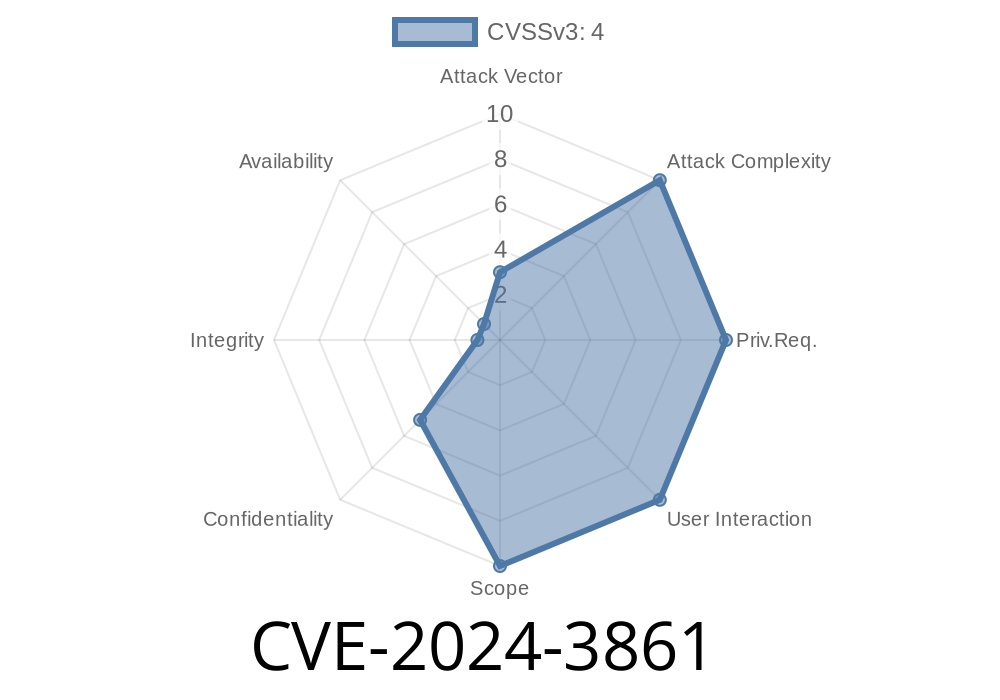CVE-2024-3861 is a recently discovered security vulnerability in Mozilla Firefox (before version 125), Firefox ESR (before 115.10), and Thunderbird (before 115.10). It centers around a subtle bug in the browser's memory handling called "use-after-free," which can cause crashes or even let attackers run code on your system.
The root of this problem is a component named AlignedBuffer in Mozilla's source code. If this component is assigned to itself, a self-move happens, which messes up the internal reference counting. This faulty ref counting can later cause data to be freed (released from memory) while still being used, leading to unpredictable behavior and security risks.
Why is Self-Assignment Dangerous?
Normally, assigning an object to itself should be a no-op or safely handled, but for AlignedBuffer, there's a move assignment operator that doesn't check for self-assignment. When you move something to itself, it can reset or corrupt internal pointers and counts, leading to memory accidents down the road.
Imagine the following C++-ish code
AlignedBuffer buf(size);
// ... buf gets filled ...
buf = std::move(buf); // Oops! self-move assignment
With most robust code, this does nothing. But for the buggy old AlignedBuffer, it resets memory management internals in a way that when buf is later used, it may already have released the memory it manages—causing "use-after-free."
Here's a simplified example of what could go wrong in the assignment operator
AlignedBuffer& operator=(AlignedBuffer&& other) {
// Free existing buffer
delete[] this->data;
// Move data pointer (this could be the same as 'this'!)
this->data = other.data;
other.data = nullptr; // But if 'this' == 'other', we just zero'ed ourselves!
return *this;
}
If this and other are the same object (due to self-assignment), data becomes nullptr, and now you have a buffer object with no valid data, but future code may still try to use it.
Exploitation: Use-After-Free
Attackers could trigger this bug via carefully crafted JavaScript or add-ons, causing the browser to try to use already-freed memory. In memory-safe programming, this is a door for all sorts of shenanigans:
Browser Crash: The simplest result, but sometimes enough to deny service.
- Remote Code Execution: In rare cases, attackers could trick the browser into running malicious code.
Data Leakage: Attackers might peek at freed memory to steal sensitive information.
Mozilla's internal fuzzers and maybe even some security researchers noticed that after triggering self-move assignment, the AlignedBuffer object entered the invalid state, causing these dangerous situations.
Who is Affected?
- Firefox before version 125 (Release Notes)
- Firefox ESR before 115.10 (ESR Notes)
- Thunderbird before 115.10 (Thunderbird Notes)
How was it Fixed?
Mozilla patched the bug by adding a simple self-assignment check to the move assignment operator. Here's what a fix might look like:
AlignedBuffer& operator=(AlignedBuffer&& other) {
if (this == &other)
return *this; // Self-assignment: do nothing
// Otherwise, do the move
delete[] this->data;
this->data = other.data;
other.data = nullptr;
return *this;
}
This single change ensures you can't accidentally nuke your own buffer!
References and Further Reading
- Mozilla Security Advisory - CVE-2024-3861
- Firefox 125. Release Notes
- Thunderbird 115.10 Release Notes
What Should You Do?
- Update Immediately: If you use Firefox, Firefox ESR, or Thunderbird, update to the latest version as soon as possible.
Watch Out for Old Add-ons: Outdated or shady browser extensions might try to exploit such bugs.
- Always Apply Security Updates: This is why vendors push updates fast—real attackers can learn from public bug reports.
Conclusion
CVE-2024-3861 is a classic reminder that even small mistakes in memory handling can open big doors for attackers. Thanks to Mozilla's open bug tracking and quick action, this dangerous bug was fixed before it became a widespread problem. Make sure you use the latest browser versions to protect yourself from sneaky use-after-free attacks!
Timeline
Published on: 04/16/2024 16:15:08 UTC
Last modified on: 07/03/2024 02:06:48 UTC
